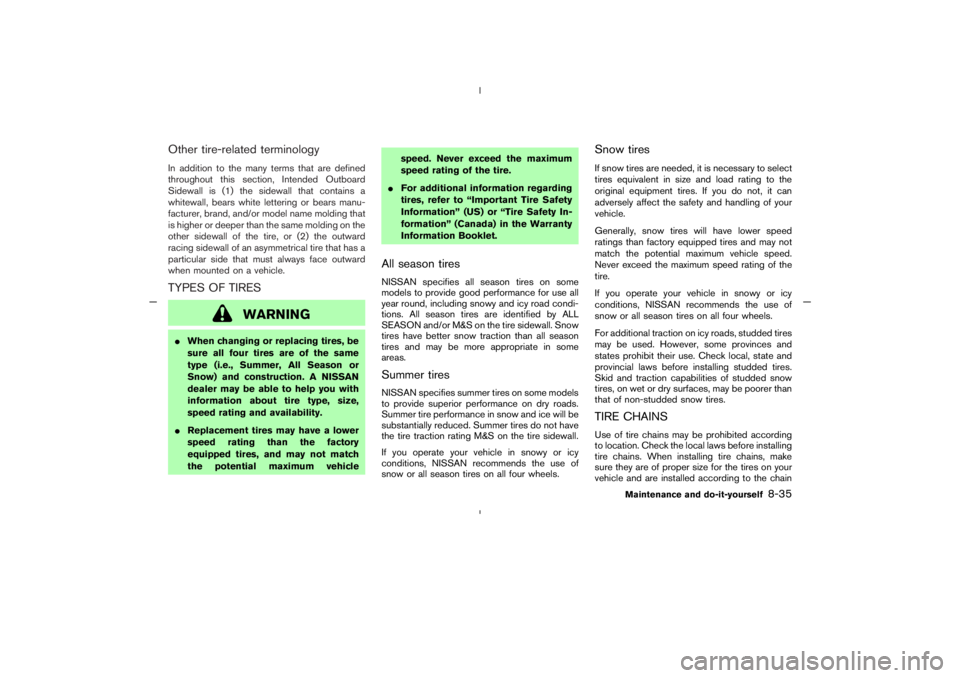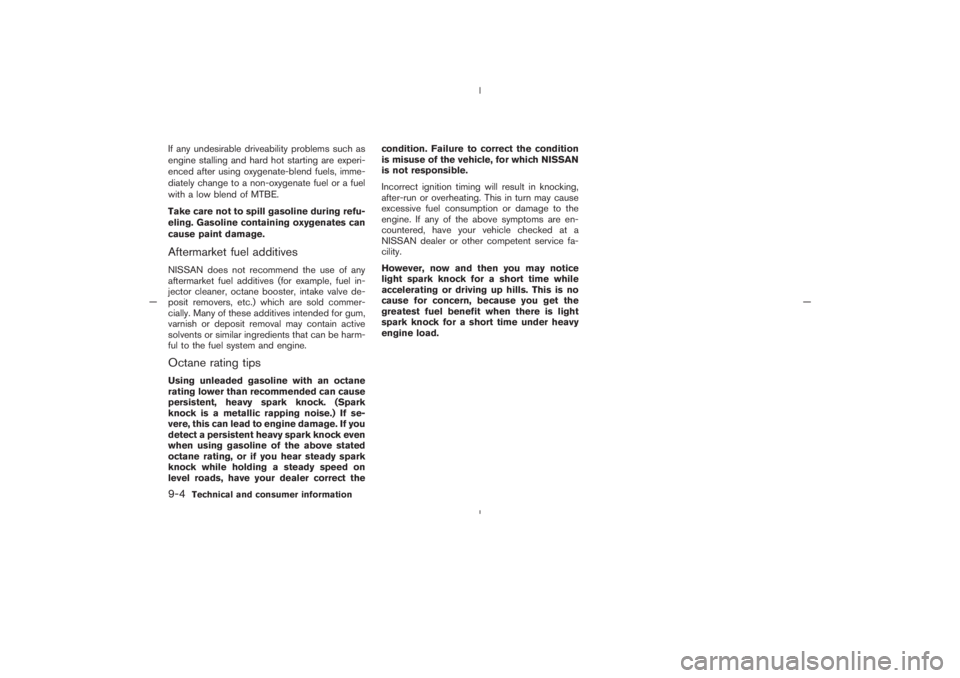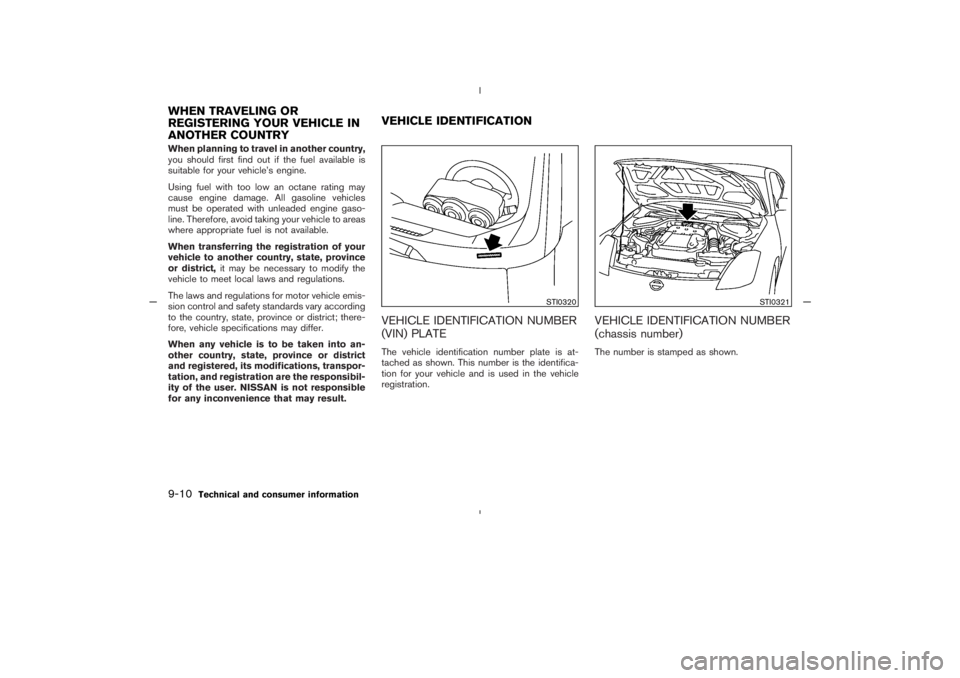Page 240 of 279

Other tire-related terminologyIn addition to the many terms that are defined
throughout this section, Intended Outboard
Sidewall is (1) the sidewall that contains a
whitewall, bears white lettering or bears manu-
facturer, brand, and/or model name molding that
is higher or deeper than the same molding on the
other sidewall of the tire, or (2) the outward
racing sidewall of an asymmetrical tire that has a
particular side that must always face outward
when mounted on a vehicle.TYPES OF TIRES
WARNING
�When changing or replacing tires, be
sure all four tires are of the same
type (i.e., Summer, All Season or
Snow) and construction. A NISSAN
dealer may be able to help you with
information about tire type, size,
speed rating and availability.
�Replacement tires may have a lower
speed rating than the factory
equipped tires, and may not match
the potential maximum vehiclespeed. Never exceed the maximum
speed rating of the tire.
�For additional information regarding
tires, refer to “Important Tire Safety
Information” (US) or “Tire Safety In-
formation” (Canada) in the Warranty
Information Booklet.
All season tiresNISSAN specifies all season tires on some
models to provide good performance for use all
year round, including snowy and icy road condi-
tions. All season tires are identified by ALL
SEASON and/or M&S on the tire sidewall. Snow
tires have better snow traction than all season
tires and may be more appropriate in some
areas.Summer tiresNISSAN specifies summer tires on some models
to provide superior performance on dry roads.
Summer tire performance in snow and ice will be
substantially reduced. Summer tires do not have
the tire traction rating M&S on the tire sidewall.
If you operate your vehicle in snowy or icy
conditions, NISSAN recommends the use of
snow or all season tires on all four wheels.
Snow tiresIf snow tires are needed, it is necessary to select
tires equivalent in size and load rating to the
original equipment tires. If you do not, it can
adversely affect the safety and handling of your
vehicle.
Generally, snow tires will have lower speed
ratings than factory equipped tires and may not
match the potential maximum vehicle speed.
Never exceed the maximum speed rating of the
tire.
If you operate your vehicle in snowy or icy
conditions, NISSAN recommends the use of
snow or all season tires on all four wheels.
For additional traction on icy roads, studded tires
may be used. However, some provinces and
states prohibit their use. Check local, state and
provincial laws before installing studded tires.
Skid and traction capabilities of studded snow
tires, on wet or dry surfaces, may be poorer than
that of non-studded snow tires.TIRE CHAINSUse of tire chains may be prohibited according
to location. Check the local laws before installing
tire chains. When installing tire chains, make
sure they are of proper size for the tires on your
vehicle and are installed according to the chain
Maintenance and do-it-yourself
8-35
�
04.8.23/Z33-D/V5.0
�
Page 247 of 279

If any undesirable driveability problems such as
engine stalling and hard hot starting are experi-
enced after using oxygenate-blend fuels, imme-
diately change to a non-oxygenate fuel or a fuel
with a low blend of MTBE.
Take care not to spill gasoline during refu-
eling. Gasoline containing oxygenates can
cause paint damage.Aftermarket fuel additivesNISSAN does not recommend the use of any
aftermarket fuel additives (for example, fuel in-
jector cleaner, octane booster, intake valve de-
posit removers, etc.) which are sold commer-
cially. Many of these additives intended for gum,
varnish or deposit removal may contain active
solvents or similar ingredients that can be harm-
ful to the fuel system and engine.Octane rating tipsUsing unleaded gasoline with an octane
rating lower than recommended can cause
persistent, heavy spark knock. (Spark
knock is a metallic rapping noise.) If se-
vere, this can lead to engine damage. If you
detect a persistent heavy spark knock even
when using gasoline of the above stated
octane rating, or if you hear steady spark
knock while holding a steady speed on
level roads, have your dealer correct thecondition. Failure to correct the condition
is misuse of the vehicle, for which NISSAN
is not responsible.
Incorrect ignition timing will result in knocking,
after-run or overheating. This in turn may cause
excessive fuel consumption or damage to the
engine. If any of the above symptoms are en-
countered, have your vehicle checked at a
NISSAN dealer or other competent service fa-
cility.
However, now and then you may notice
light spark knock for a short time while
accelerating or driving up hills. This is no
cause for concern, because you get the
greatest fuel benefit when there is light
spark knock for a short time under heavy
engine load.9-4
Technical and consumer information
�
04.8.23/Z33-D/V5.0
�
Page 253 of 279

When planning to travel in another country,
you should first find out if the fuel available is
suitable for your vehicle’s engine.
Using fuel with too low an octane rating may
cause engine damage. All gasoline vehicles
must be operated with unleaded engine gaso-
line. Therefore, avoid taking your vehicle to areas
where appropriate fuel is not available.
When transferring the registration of your
vehicle to another country, state, province
or district,it may be necessary to modify the
vehicle to meet local laws and regulations.
The laws and regulations for motor vehicle emis-
sion control and safety standards vary according
to the country, state, province or district; there-
fore, vehicle specifications may differ.
When any vehicle is to be taken into an-
other country, state, province or district
and registered, its modifications, transpor-
tation, and registration are the responsibil-
ity of the user. NISSAN is not responsible
for any inconvenience that may result.
VEHICLE IDENTIFICATION NUMBER
(VIN) PLATEThe vehicle identification number plate is at-
tached as shown. This number is the identifica-
tion for your vehicle and is used in the vehicle
registration.
VEHICLE IDENTIFICATION NUMBER
(chassis number)The number is stamped as shown.
STI0320
STI0321
WHENTRAVELING OR
REGISTERING YOUR VEHICLE IN
ANOTHER COUNTRYVEHICLE IDENTIFICATION9-10
Technical and consumer information
�
04.8.23/Z33-D/V5.0
�
Page:
< prev 1-8 9-16 17-24